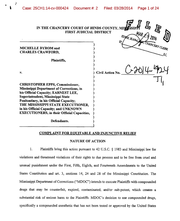Wednesday, March 26, 2014
The death sentences of Michelle Byrom (pictured) and Charles Crawford have put Mississippi in the midst of the controversy over what constitutes “cruel and unusual” in executions.
Mississippi's pending executions of Michelle Byrom and Charles Crawford—which are not yet scheduled—have mired the state in a controversy over what constitutes "cruel and unusual" in executions.
Anti-death penalty groups, such as the American Civil Liberties Union, argue that inflicting torturous pain to kill a person is little more than vengeance.
As a civilized society, the United States should do better than inflict excruciating death even on those who have done no better for their victims, they say.
"It is the ACLU's position that all five current methods of execution violate the Eighth Amendment's ban on cruel and unusual punishment, which prohibits the imposition of gratuitous pain," the group states on its website. "The most commonly used method of lethal injection, now the primary method of execution, violates that prohibition by using a sequence of drugs that creates an unnecessary risk of excruciating pain."
"[O]ne cannot know whether lethal injection is really painless, and there is evidence that it is not. As the U.S. Court of Appeals observed, there is 'substantial and uncontroverted evidence ... that execution by lethal injection poses a serious risk of cruel, protracted death. ... Even a slight error in dosage or administration can leave a prisoner conscious but paralyzed while dying, a sentient witness of his or her own asphyxiation,'" the site states.
Anti-death penalty efforts have made the execution process expensive, lengthy and relatively uncommon in the U.S., while making the methods for state-sanctioned killings as quick and painless as possible. But, although lethal injection may be more "humane" than hanging, electrocution or gas, preponderance of evidence shows that execution does not deter violent crime. Eighteen U.S. states and Washington, D.C., have abolished the death penalty.
The European Union has long banned executions. Under public pressure, manufacturers of sodium thiopental stopped selling to the U.S., whereupon the states substituted pentobarbital in its execution drug "cocktail." Danish pharmaceutical manufacturer Lundbeck stopped selling pentobarbital to the states in 2011. With supplies running short, states such as Mississippi have sought alternative methods to procure the drugs.
The effort has met mixed success.
On Jan. 10, Oklahoma executed Michael Lee Wilson, 38, using pentobarbital to sedate him as the first of three drugs that would eventual end his life. As the drug entered his veins, Wilson cried out, "I feel my whole body burning." In Ohio one week later, Dennis McGuire, 53, reportedly writhed in agony for 25 minutes, groaning and gasping for breath before finally dying.
McGuire's attorneys had attempted to stop his execution by arguing that Ohio's untested combination of drugs could lead to "air hunger," a medical term for suffocation. McGuire would experience "agony and terror" while struggling to breathe, they said. Apparently, that is precisely what occurred.
"He started making all these horrible, horrible noises, and at that point, that's when I covered my eyes and my ears," Amber McGuire told The New York Times after watching her father's execution.
Mississippi Department of Corrections records indicate that the state has turned to a Grenada compounding pharmacy, H&W Compounding/Brister Brothers Pharmacy, for pentobarbital, vecuronium bromide and potassium chloride used in executions. Brister markets non-prescription herbal supplements. Earlier this month, after MDOC resisted disclosing its supplier or the drugs' expiration dates, the Roderick & Solange MacArthur Justice Center in New Orleans filed suit on behalf of Byrom and Crawford to reveal the information.
With scant oversight and poor regulation, compounding pharmacies have aided in killing at least 145 people. In 2007 and 2008, 81 Americans died from tainted heparin compounded from Chinese ingredients. Sixty-four died in 2012 after receiving steroid injections. In both cases, the pharmacies obtained the drugs through legal means.
"If the first drug is not effective in achieving anesthetic 'death' for the prisoner, when you inject the paralytic agent, which is step two, in addition to having severe internal burning sensations, it is going to be the functional equivalent of suffocating somebody," Jim Craig, an attorney with Roderick and Solange, said. "In essence, you are stopping their muscles from working—including their lungs from taking in air."
"It really a very gruesome process," Craig added. "... Opacity prevents accountability, and that's exactly the problem."
"We have no assurance that this compounded pentobarbital is sufficiently potent and effective," Roderick and Solange attorney Vanessa Carroll said in a statement.
"This is an enormous concern because pentobarbital is the first drug administered during a lethal injection, and if it fails to work properly, the prisoner will be suffocated to death by the paralytic agent that is given next and may be conscious during the excruciating pain caused by the third drug, which causes death by cardiac arrest."
"No one has sentenced Ms. Byrom and Mr. Crawford to be slowly suffocated to death and to have their internal organs burned while conscious of it," Craig said. "That's not what they were sentenced to. They weren't sentenced to be tortured."
Read the story that drew worldwide attention to Michelle Byrom's case at jfp.ms/byrom.

